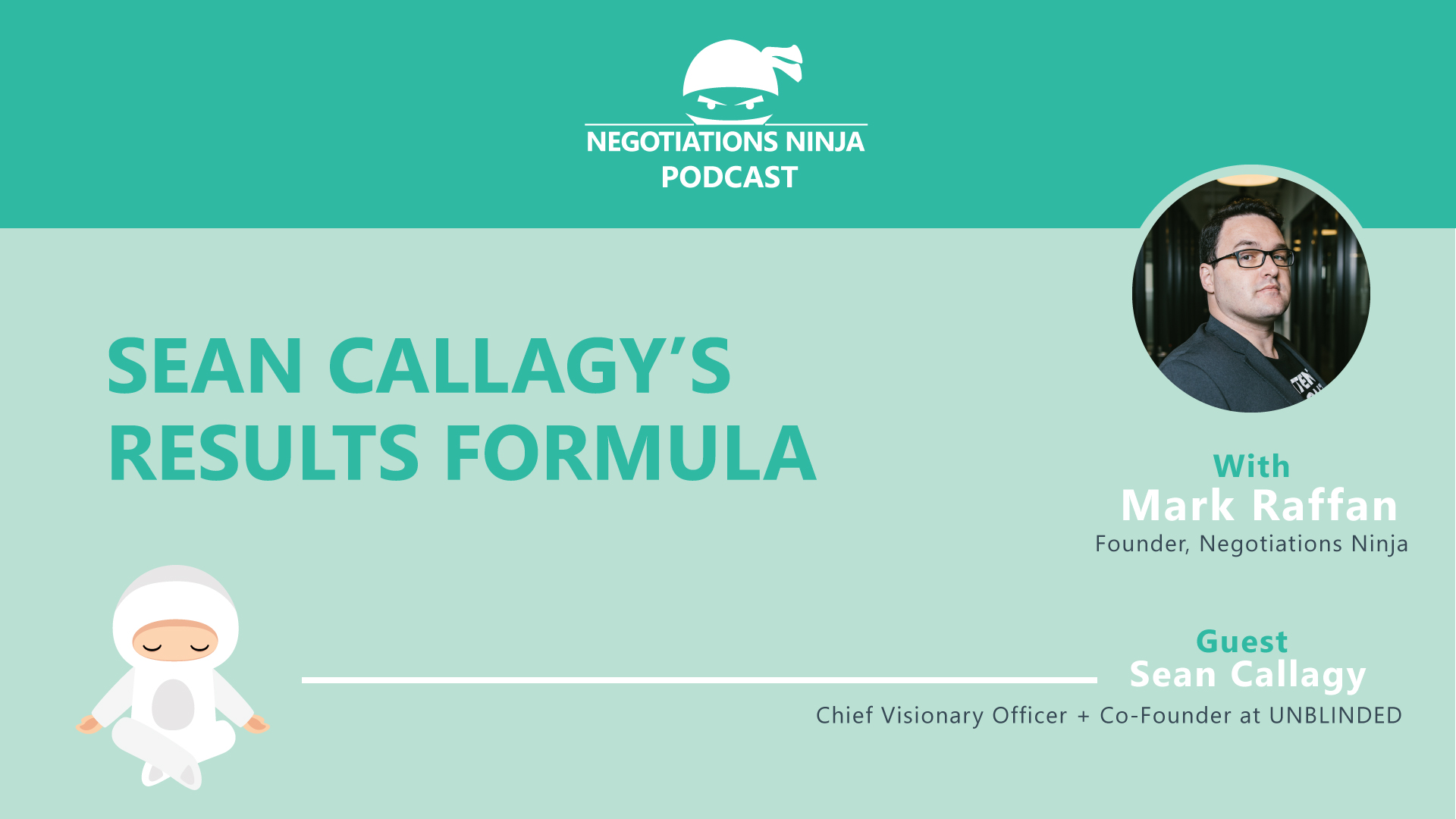Sean is the Chief Visionary Officer + Co-Founder at UNBLINDED, a company focused on influence, process, and self-mastery. He is a successful attorney, speaker, entrepreneur, business coach, and the owner and President of Callagy Law. In this episode of Negotiations Ninja, he shares his four-step results formula to master the power of influence and communicating effectively—to take a “no” to a “yes” in an ethical, powerful way.
Outline of This Episode
- [2:10] Sean Callagy’s background
- [4:01] Law schools lack negotiation education
- [5:41] The creation of emotional rapport
- [8:34] Pain and the yes strategy
- [11:18] How to develop emotional states
- [14:58] Behavioral economics and the fear of loss
- [16:11] How to develop a congruent unique identity
- [19:22] How to develop congruence
- [23:12] What is agreement formation all about?
- [25:15] How to connect with Sean Callagy
The power of influence
Sean discovered that influence is a superpower 23 years ago. He started going blind and couldn’t live out his dream career as a baseball player, so he went to law school. He didn’t necessarily care about becoming an attorney. But he was blown away to find out that influence mattered in the world. But they don’t teach you about the power of influence and negotiation in your ivy league education.
People in his law firm who were less inexperienced were experiencing more money, more freedom, and more influence over their life and other people than those who had been there much longer. Those who can influence were in the positions they wanted to be. He realized he had none of those abilities and needed to learn them and acquire them. That began his lifelong journey to become influential.
Why law schools don’t provide formal negotiation education
Sean points out that it’s an extraordinary failing that needs to be fixed. He is perplexed by what is taught in elementary school, high school, college, graduate school, medical school, and law school. He ponders, “I literally thought that law schools should be liable for fraud for accepting students and not giving them any optic on the economic dynamics of becoming an attorney.”
He thought that you become an attorney and automatically make a good living. He left school with $100,000 in debt. He had gotten “The” job out of law school. But it put him in a position where he could barely pay his rent, his car payment, and his law school loan. He firmly believes that there are major flaws in the educational system, particularly in teaching the skill of influence. So he sought to spend his career developing the skill of influence—and now he teaches it in his results formula.
The Callagy Results Formula
What does Sean’s formula look like? It’s a four-step process:
- Create emotional rapport: You have to move beyond surface-level rapport and create an emotional connection with strong two-way communication and value-exchange.
- Pain and the “yes” strategy: People make decisions because the pain of not taking the action exceeds the pain of taking the action. You have to help them find that pain point and take them to a “yes.”
- Develop a congruent unique identity: Your offering, who you are, what your company is—all need to be congruent and unique. Your counterpart needs to perceive you to be credible.
- Agreement formation: Agreement formation is about believing that what you’re proposing is best. You get there through effective questioning, leaning into objectives, and level 5 listening.
The creation of emotional rapport
The first step in Sean’s results formula begins with creating emotional rapport. Sean points out that there are three levels of rapport: surface, real, and emotional. Influence is about having an idea, communicating the idea, having it be received by somebody else, and acted upon. If you don’t have emotional rapport and listening is not open, all you sound like is Charlie Brown’s teacher.
Emotional rapport means your message must be open for receipt. There needs to be trust and belief that the communication you’re having is authentic because a connection has been established. Communication is about perspective on value exchange—not about relationships. He points out that the issue lies in the misinterpretation of value that happens without emotional rapport.
You have to believe in the authenticity of the perceived value. That comes on the heels of the establishment of emotional rapport. It’s connecting at more of a heart level than a head level. Sean emphasizes that it applies to the courtroom, to engineering, to prisons, to every conceivable dynamic.
People have developed the idea in their mind that they have to persuade someone based on the logic of their argument. But emotion plays such a large part. Everyone talks about logos but hardly anyone talks about pathos—the emotional aspect. Emotional rapport is sorely missing in so much influence teaching.
Sean takes a deep-dive into finding people’s pain and utilizing the “yes” strategy, how to develop a congruent unique identity, and how to get to agreement formation in the rest of this episode. Tune in to learn more about how to master the power of influence!
Resources & People Mentioned
Connect with Sean Callagy
- Unblinded Mastery
- Callagy Law
- Connect on LinkedIn
Connect With Mark
- Follow Negotiations Ninja on Twitter: @NegotiationPod
- Connect with Mark on LinkedIn
- Follow Negotiations Ninja on LinkedIn
- Connect on Instagram: @NegotiationPod
- negotiations.ninja




